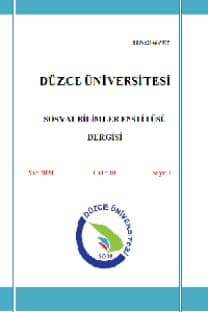ESKİ BALKANLAR YENİ SINIRLAR: ESKİ YUGOSLAVYA’NIN DAĞILMA SÜRECİNDE TÜRKİYE - BOSNA-HERSEK İLİŞKİLERİ
Devletlerin özellikle bölgelerinde olan değişiklikler, birçok dış politika kararları alınması zorunlu kılmaktadır. Doğu Bloğunun 1990’ların başında yıkılması hem Doğu Bloku devletleri hem de diğer devletler açısından sancılı bir dönemin başlangıcı olmuştur. Balkan yarımadası ve Kafkasya’da bu süreç, daha şiddetli ve derinden hissedilmiş, çatışmalar günlük hayatın alışılamayan bir rutini haline gelmiştir. Türkiye’nin de konumu sebebiyle etkilendiği bu geçiş ve çatışma süreci, sadece bölge halklarını değil, uluslararası siyasal sistemdeki gelişmelerin de etkisiyle, küresel ve bölgesel güçleri de karşı karşıya getirmiştir. Çatışan tarafların yanında ve dışardan bölgedeki güçleri destekleyen devletler, çözüm için de bir araya gelmek zorunda kalmıştır. Birçok kez barış görüşmelerinin sonuçsuz kalması, daha güç şartlar ve derinleşen çatışma olarak geri dönmüştür. Türkiye bölgesel bir güç olarak, eski Yugoslavya’nın dağılma sürecini en sarsıcı hisseden devletlerden biridir. Gerek Balkan yarımadasında bulunması, arada kopmalar rağmen gerekse Bosna-Hersek’le tarihi çok eskiye dayanan uzun soluklu bir yakın içerisinde olması, çatışmanın da çözümün de etkili tarafı olması ile sonuçlanmıştır. 1995 Dayton Antlaşması’yla sonuçlanan yaklaşık 4 yıllık periyod, Bosna-Hersek meselesini Türk Dış politikasının öncelikli konularından biri haline getirmiştir. Bosna-Hersek’in kuruluş aşamasında Türk Dış politikası sadece moral destek olmamış, aynı zamanda önemli sonuçlar da doğurmuştur.
FORMER BALKANS NEW BORDERS: TURKEY - BOSNIA HERZEGOVINA RELATIONS IN THE PROCESS OF THE DISSOLUTION OF THE FORMER YUGOSLAVIA
The changes in the states, especially in their regions, in this sense states must take many foreign policy decisions. The destruction of East Block at the beginning of the 1990s was the significant starting point in other words period and it was a painful turn in terms of both the Eastern Bloc states and other states. This process has been felt more intensely and deeply in the Balkan peninsula and the Caucasus, and the conflicts have become an unconventional routine of everyday life. In this regard Turkey which is also influenced by its position and it is influenced by this process of transition and conflict in line with this not only by the peoples of the region but also by means of developments in the international political system global and regional powers are in conflicts with each other. The states which supported the forces and in and out of conflicting parties in region had to come together for a solution. Many times, the result of peace negotiations was not successful, so it returned more difficult conditions and deepening conflict. As a regional power; Turkey is one of the state which has traumatic process while the disintegration of the former Yugoslavia. Despite of sometimes the cut off relations with Bosnia Herzegovina and Turkey but there is a long-term close relationship with each other which is based upon history. The fact that Turkey is located on the peninsula of Balkan and because of these political factors and conditions in the end Turkey is a place of solution and conflict in this political issue. As a final remark, the nearly four-year period that resulted with the 1995 Dayton Treaty and in this respect Bosnia-Herzegovina issue was one of the priority issues of Turkish foreign policy. During the establishment in other words construction process of Bosnia-Herzegovina, Turkish foreign policy was not only moral support, but also it had important consequences in this context.
Keywords:
Balkans, Bosnia-Herzegovina Turkish Foreign Policy,
___
AGİT Belgeleri, Commission on Security and Cooperation in Europe. http://csce.gov/index.cfmFuseAction=UserGroups.Home&ContentRecord_id=250&ContentType=G&ContentRecordType=G&UserGroup_id=5&Subaction=ByDate, (30.12.2009).Armaoğlu, F. (2000). Yirminci Yüzyıl Siyasî Tarihi 1914-1995, İstanbul: Alkım Yayınevi.
Christoph, S. (2000). The Contact Group and Its Impact on the European Instutional Structure, Occasional Paper 16, Institute For Security Studies, Paris, Western European Union.
Encyclopedia Britannica, (1998). https://www.britannica.com/event/Warsaw-Pact (10.04.2017).
Haskin, J. M. (1995). Bosnia and Beyond: the "Quiet" Revolution that Wouldn't Go Quietly, Algora Publishing.
Hürriyet (2017). http://www.hurriyet.com.tr/tsknin-yurt-disi-baris-misyonlari-175858 (10.04.2017).
Yasa, I. Kuzey Kafkasya'daki Etnik Kompozisyon ve Çatışmalar,http://www.bilgesam. org/incele/1000/-kuzey-kafkasya'daki-etnik-kompozisyonve-catismalar/#.WRiuyNLyhdg (Erişim:14.04.2017).
Keesing’s Record of World Events: Volume 38 (1992). Ed. by. Roger East, 60 Year of Publication, Cambridge, Longman.
Keesing’s Record of World Events: Volume 41 (1995), Ed. by. Roger East, 60 Year of Publication, Cambridge, Longman.
Kosova Bağımsızlık Bildirisi, http://www.assembly-kosova.org/common/docs/Dek_Pav_e.pdf, (19.11.2011).
NATO Resmi Sitesi, https://www.nato.int/cps/en/natohq/nato_countries.htm, (10.04.2017)
Oran, B. (2006). Türk Dış Politikası, Kurtuluş Savaşından Bugüne Olgular, Belgeler, Yorumlar, Cilt II. (1980-2001), İstanbul, İletişim Yayınları.
Öksüz, H. (2006). Batı Trakya Türkleri, Çorum, KaraM Araştırma ve Yayıncılık.
Sönmezoğlu, F. (2005). Uluslararası Politika ve Dış Politika Analiz, 4 Baskı, İstanbul, Filiz Kitapevi.
Türbedar, E. Yugoslavya’nın Dağılması ve Bosna Savaşı Kronolojisi (1986-1995) (Çevrimiçi) http://www.balkanskidom.com/showthread.php?p=704, (02.06.2010).
UN Documents, BM Güvenlik Konseyi Kararı, S/RES/713 (1991), http://www.un.org/Docs/scres/1991/scres91.htm.,(17.06.2010).
UN Documents, BM Genel Sekreteri S/2007/168 (2007) Sayılı Mektubu http://www.unosek.org/docref/report-english.pdf, (Erişim:11.11.2011).
UN Documents, YearBook 1995, http://unyearbook.un.org/unyearbook.html?name=1995index.html s.51, (Erişim:01.02. 2010).
UN Documents, BM Güvenlik Konseyi S/RES/755 (1992) Sayılı Kararı, SC/RES/755, meeting 3079th. http://www.un.org/documents/sc/res/1992/scres92.htm.,(Erişim:07.06.2010).
Yugoslavya 1946 Anayasa’sı http://www.worldstatesmen.org/Yugoslavia_1946.txt, (Erişim:30.12.2009).
Yugoslavya 1953 Anayasası, http://www.arhivyu.rs/active/en/home/glavna_navigacija/leksikon_jugoslavije/konstitutivni_akti_jugoslavije/ustavni_zakon_1953.html, (30.12.2009).
Yugoslavya 1963 Anayasası, http://www.worldstatesmen.org/Yugoslavia_1963.txt, (30.12.2009).
Yugoslavya 1974 Anayasası, http://www.osaarchivum.org/files/holdings/300/8/3/text/81-3-1.shtml, (11.11.2011).
- ISSN: 2146-5975
- Yayın Aralığı: Yılda 2 Sayı
- Yayıncı: Düzce Üniversitesi
Sayıdaki Diğer Makaleler
İSLÂM MUHÂKEME HUKUKUNDA DELİL SİSTEMLERİ VE HÂKİMİN TAKDİR YETKİSİ
KİTAP İNCELEMESİ - ESKİ UYGURCA DÖRT ÇATİK
AB VE TÜRKİYE GAZETE DAĞITIM KANALLARI KARŞILAŞTIRMASI VE FARKLARININ ANALİZİ
Murat ÖZTERMİYECİ, Ayhan Nuri YILMAZ
YAŞLILARIN BARINMA İHTİYACINA ALTERNATİF OLARAK SÜRDÜRÜLEBİLİR YAŞLI KÖYLERİ
Aybala DEMİRCİ AKSOY, Gülay GÜNAY
TOPLUMDA ALGILANAN DOKTOR İMAJININ SAĞLIK HİZMET KALİTESİ ÜZERİNE ETKİSİ: BOLU VE DÜZCE ÖRNEĞİ
Ömer Seyfettin SEVİNÇ, Mustafa ERGENÇ
TANZİMAT’TAN II. MEŞRUİYET’E OSMANLI’DA MİZAH BASINI
OKUL YÖNETİCİLERİNDE İŞ DOYUM VE DOYUMSUZLUĞUNA NEDEN OLAN FAKTÖRLER
